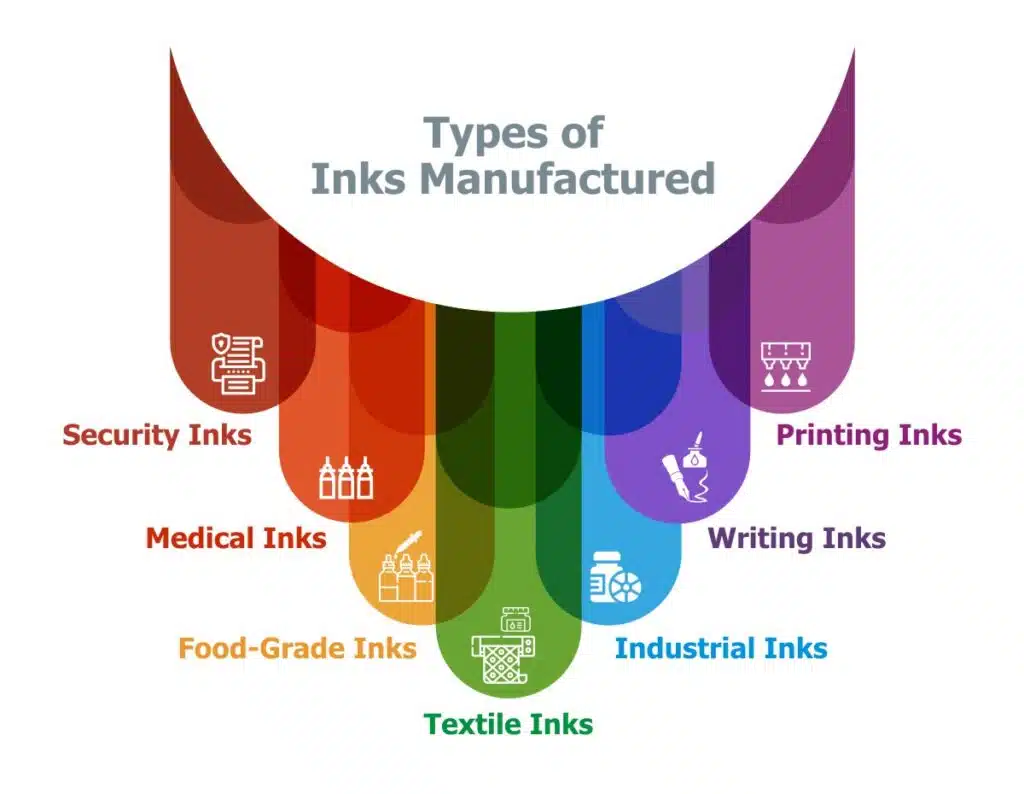
“Pale ink is better than a retentive memory.”
From centuries, ink is there to serve a purpose. Take a look around you, right from the beautiful wallpaper you see, the latest novel you are reading, the bright package labelling options in the market, to those lovely photographs you adore yourself in, ink finds numerous applications in our daily lives.
However, today, the increasing demand of ink across various sectors presents a formidable challenge for manufacturers. This is primarily due to the requirement of diverse formulations for distinct types of inks, tailored to meet specific application requirements.
Overcoming these challenges require manufacturers to be on their toes always. This is because each step of ink manufacturing, such as raw material sourcing, mixing, and blending, checking colour consistency, viscosity, etc. requires precise control and adherence to set industry standards.
Manging all these tasks manually would consume a lot of resources including cost, time, and labour. On contrary, adopting a tool like ERP that could automate all such time-consuming operations, would help organizations maximize their working efficiency.
Types of Inks Manufactured-
As discussed, irrespective of the type of sector, ink plays a vital role. And, according to its different applications in every sector, its properties, and physical attributes changes. Below are some common types of inks used in multiple sectors today-

Printing Inks-
Widely used in the publishing, printing, and packaging industry, printing inks are formulated to deliver vibrant colours, fast drying times, and excellent adhesion.
Writing Inks-
Used in pens, markers, and for other writing purpose, this type of inks are manufactured to provide smooth flow, consistent colour, and quick drying properties.
Industrial Inks-
As the name suggests, industrial inks are used in the manufacturing sectors like automotive, electronics, etc., for product marking and labelling. Such inks are expected to withstand harsh environments and capable of being applied to any surface.
Textile Inks-
With the aim to create designs on fabrics and apparels, these inks are formulated, keeping in mind that the ink should withstand repeated wash cycles.
Food-Grade Inks-
Since this type of inks are created for food packaging and labelling applications, the primary aim is to ensure they are non-toxic, and FDA approved.
Medical Ink-
Marking their importance in the medical devices and pharmaceutical packaging, medical inks must meet stringent regulatory requirements, ensuring biocompatibility and sterilization resistance, etc.
Security Inks-
Mainly used for document authentication such as currency, passports, etc., these inks are prepared by mixing special additives to ensure UV protection or colour changing properties to prevent fraud and counterfeit.
Challenges Ink Manufacturers Face-
Today, when the demand for different and new-age inks are growing aggressively, ink manufacturers are encountering several challenges in their operations-
Production Challenges-
Different ink formulations require specific manufacturing process including variations for colour, viscosity, and drying time. However, managing these complex formulations and the manufacturing processes associated with them while ensuring consistent quality across batches presents a significant challenge for production planners.
Raw Materials Management-
Effective management of raw materials such as pigments, resins, solvents, additives, etc. is crucial. Since the quality of these materials defines the product quality. However, ink manufacturers find manual raw material management to be challenging and error prone.
Complexity of Formulations-
As discussed above, with every ink type, formulation and physical property requirements changes significantly. For this reason, manufacturers need to develop numerous ink formulations to meet customer requirements as precisely as possible.
And for this, performing formula calculations manually becomes a challenging, time-consuming, and error-prone ask for manufacturers.
Ensuring Quality Control-
Because of the prominent usage of ink in the industries like food, pharma, etc., ensuring quality stands as a significant challenge in front of manufacturers. It is necessary to maintain consistent quality across all batches along with ensuring adherence to the physical properties like colour accuracy and printability prerequisites.
Adhering to Environmental Regulations-
Due to the volatile organic compound (VOCs) emissions during ink production and the involvement of hazardous materials, poses regulatory and operational challenges for ink manufacturers, against which they need to be prepared to prevent legal fines.
For instance, the manufacturers must comply with the Toxic Substances Control Act (TSCA) that regulates the manufacturing, processing, distribution, use, and disposal of chemicals used in ink formulation.
Supply Chain Disruptions-
Supply chain disruptions like raw material shortage, transportation delays, or geopolitical issues can hamper production schedules, resulting in increased costs. Overcoming such situations presents a significant challenge to manufacturers.
How ERP Transforms the Ink Manufacturing Industry?
Simplifies Formulation-
The robust recipe/formula management module of the ERP software allows manufacturers to create, manage and track formulas for diverse types of inks, including variations and versions for colour, viscosity, drying time, and other properties.
Besides, it helps manage everything related to formulation- their versions, approvals, sizing, scaling, material substitution, comparison and more. An ERP software even helps manage the recycling of ink by using leftover inks in different formulas.
Colour Matching and Consistency:
ERP software for ink offers tools for precise colour matching that enables meeting customer specifications and ensures consistency across batches and production runs.
Streamlines Production-
ERP software enables dynamic planning and scheduling of production. Batches created can be scaled or adjusted to meet the last-minute changes in customer requirement and demand. It monitors batch parameters, such as mixing times, temperatures, and ingredient quantities, to ensure adherence to formula specifications.
Moreover, by coordinating time and sequencing of batch runs, it also increases the effectiveness of batch processing, optimizes equipment utilization, and minimizes changeover (clean up, set up, and start up) time.
Recycling ink to use leftover inks in other formulas is also managed through an ERP software.
Helps Uphold Quality Standards-
The QC module of ERP supports quality control by defining quality checkpoints and inspection criteria at various stages of the manufacturing process.
It records quality test results, identifies non-conforming batches, and initiates corrective actions to maintain product quality standards.
ERP software helps ink manufacturers evaluate if the set standards are met and identify issues related to colour inconsistency, viscosity fluctuations, poor adhesion, ink bleeding, etc. and address them proactively, minimizing impact across other batches.
Ensures Adherence to Regulations-
ERP for ink manufacturing facilitates standardization of processes across the organization, ensuring adherence to compliance requirements.
Besides this, it tracks the complete supply chain including production processes, raw materials, intermediates, and finished goods—ensuring a strict adherence to compliance.
Optimizes Inventory Management-
Ink management software keeps track of how much ink you use by updating its records whenever you mix colours. It also gives you info like how much ink you have, what you need to reorder, prices, and the total value of your ink stock. Plus, it can let other departments, like accounting, access this data if needed.
Its industry-specific functionalities also assist in managing hazardous materials in compliance with industry regulations, including proper storage, handling, and disposal procedures.
Incorporates Technological Advancements-
By automating and streamlining all the core, time-consuming operations, an ERP software allows manufacturers to engage their workforce in other important tasks.
Moreover, its powerful tool for New Product Development (NPD) allows the R&D department to create and test multiple formulas at a time and run sample production batches. This helps bring innovation in action and reduces time to market of the new products.
Concluding Thoughts-
In the dynamic world of ink manufacturing, where precision, quality, and compliance are paramount, ERP solution tailored for the ink industry emerges as a game-changer. If you are an ink manufacturer and looking for an effective ERP solution then, BatchMaster ERP is there to help you. Get in touch with our team to know more.



















